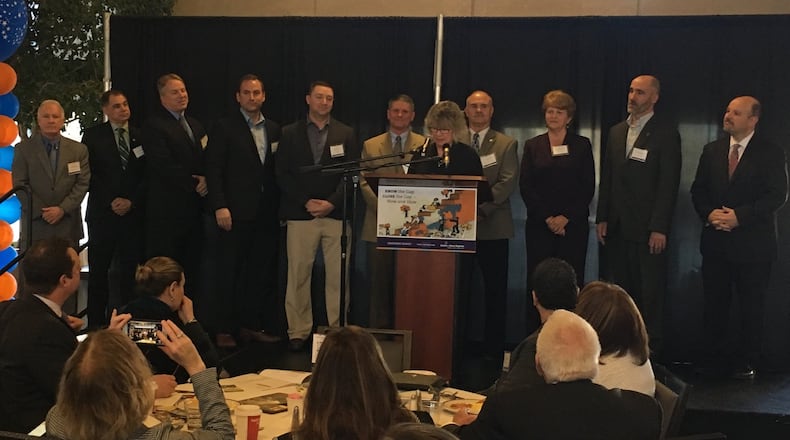2017 SUMMIT: Leaders take aim at racial achievement gap
“Despite all of the great projects we’ve put together, one of our challenges as we continue to track our data, is we’re not yet seeing movement in our countywide average achievement scores the way we would like,” said Robyn Lightcap, executive director of Learn to Earn Dayton.
At the annual countywide Kindergarten Readiness Summit on Friday, more than 500 educators, politicians and parents reviewed data and heard presentations on curriculum, equity and other issues. As the first measure a school district gets, kindergarten readiness depends largely on the efforts of families, preschools and child care centers. Many studies suggest that students who are more ready for kindergarten have better long-term school success.
TRENDING: Oakwood actress Allison Janney wins first Oscar
School-by-school data
Kindergarten readiness percentages for 2016-17 ranged from 57 percent among Miamisburg and Centerville kindergarteners to 3 percent in Jefferson Twp., and 17 percent in Trotwood.
“Our elementary-level people, from the top down, do a nice job of working with our preschools – setting expectations on what they can do to get kids ready for kindergarten,” Miamisburg Superintendent David Vail said. He said the integrated approach also involves library summer reading programs and other community efforts.
Centerville saw a huge surge from a roughly average 40 percent readiness the previous two years to 56.7 percent in 2016-17. District officials said they weren’t aware of any systemic changes that year that would account for the change.
2015 SUMMIT: Kindergarten readiness flat locally
Amy Allen, principal of Centerville’s Primary Village South school, said collaboration between the school district and early childhood providers is a key there as well, along with training on teaching methods. She said kindergarten teachers share specific strategies with preschool staff on what helps kids make the transition. Centerville also has a six-week summer program available to students about to start kindergarten.
But none of the other school districts in the county saw their kindergarten student readiness increase by more than 1 percentage point. And five districts saw kindergarten readiness drop by 10 percentage points for 2016-17.
Trotwood-Madison’s readiness level has bounced from 13 percent, to 26 percent, back down to 17 percent for 2016-17. Lisa Minor, curriculum director for Trotwood schools, said in the past year-plus, her district has worked on moving those students forward once they get to school. She said a more culturally connected curriculum, new discipline programs and after-school mentoring have resulted in lower suspension and discipline referral rates.
RELATED: Preschool Promise grows but needs more Dayton families
The area’s two Preschool Promise communities (Dayton and Kettering) were just in a pilot program for the time of the 2016-17 kindergarten data, but they performed better than most, with Kettering’s readiness rising from 39.7 percent to 40.6 percent for that year, and Dayton’s dropping less than half a percentage point to 20.2.
Lightcap said she’d like to think the Preschool Promise program made a difference, but said it is too early to say that, since the program is only in its first full year of full implementation now, affecting students who will start kindergarten in 2018-19.
Racial gap continues
Lightcap said the last two years, local officials have examined how to close the racial gap in readiness, as 41 percent of the county’s white children test as “ready” for kindergarten in the county, while only 19 percent of black students do.
“We did not ever talk about racial equity until last year. I think we’re dissecting the data more now,” she said. “We have to dive deeper and look beyond economics, and that’s where we see this big racial gap. … This work is tough.”
Last year’s kindergarten summit asked educators, a majority of them white, to consider the possibility of “implicit bias” affecting how they treat even the youngest children. School suspension data and video-monitored experiments showed inequality of treatment.
EDUCATION: Students’ classroom time varies widely by district
This year, in a video from the student perspective, young black men discussed a cultural obstacle where fellow black students mocked peers who were trying to excel, with one telling another, “Don’t try to be better than me.”
“I think those are huge issues,” Lightcap said. “Our expectations need to be equally high no matter what a child’s background is racially or economically. … But we have to have sensitivity to their background (and traumas) at the same time.”
Tom Lasley, CEO of Learn to Earn Dayton, urged state legislators not to approve a proposal to change the state’s Kindergarten Readiness Assessment again. The KRA was made more comprehensive for 2014-15, measuring social/emotional development, early math skills and motor development, in addition to beginning literacy, and Lightcap said educators are still adjusting to those changes.
SCHOOLS COVERAGE: Follow Jeremy Kelley on Facebook and Twitter
Lasley said changing the standards again would make it even more difficult for schools and other agencies to track whether the strategies they’re trying are making a difference year-over-year.
About the Author

